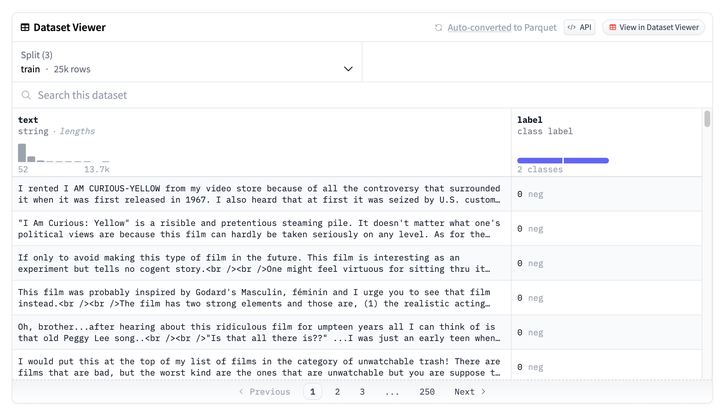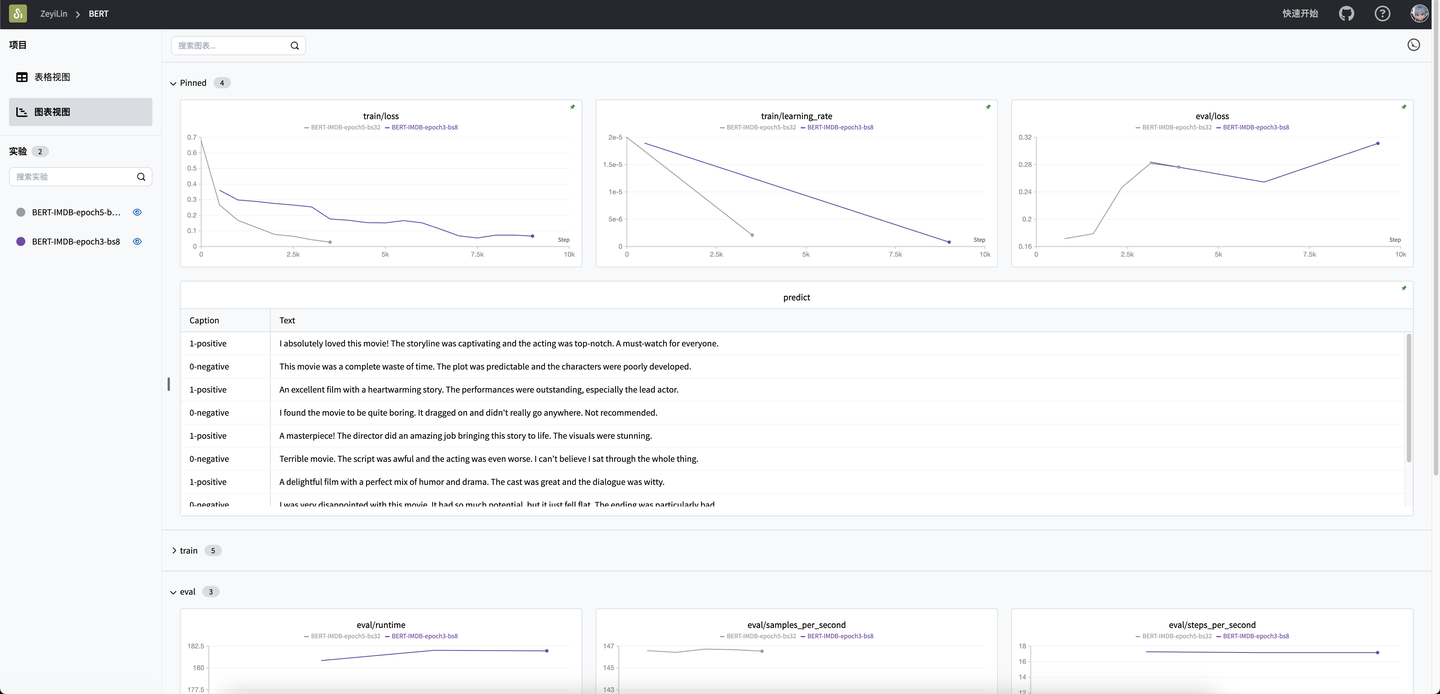BERT文本分类
INFO
自然语言处理、文本分类、机器学习入门
概述
BERT(Bidirectional Encoder Representations from Transformers)是由Google提出的一种自然语言处理预训练模型,广泛应用于各种自然语言处理任务。BERT 通过在大规模语料库上进行预训练,能够捕捉词汇之间的上下文关系,从而在很多任务上取得了优秀的效果。
在这个任务中,我们将使用 BERT 模型对 IMDB 电影评论进行情感分类,具体来说是将电影评论分类为“正面”或“负面”。

IMDB 电影评论数据集包含50,000条电影评论,分为25,000条训练数据和25,000条测试数据,每部分又包含50%正面评论和50%负面评论。我们将使用预训练的 BERT 模型,通过微调(finetuning)的方式,来对这些评论进行情感分类。
环境安装
本案例基于Python>=3.8,请在您的计算机上安装好Python。 环境依赖:
txt
transformers
datasets
swanlab快速安装命令:
bash
pip install transformers datasets swanlab本文的代码测试于transformers==4.41.0、datasets==2.19.1、swanlab==0.3.3
完整代码
python
"""
用预训练的Bert模型微调IMDB数据集,并使用SwanLabCallback回调函数将结果上传到SwanLab。
IMDB数据集的1是positive,0是negative。
"""
import torch
from datasets import load_dataset
from transformers import AutoTokenizer, AutoModelForSequenceClassification, Trainer, TrainingArguments
from swanlab.integration.huggingface import SwanLabCallback
import swanlab
def predict(text, model, tokenizer, CLASS_NAME):
inputs = tokenizer(text, return_tensors="pt")
with torch.no_grad():
outputs = model(**inputs)
logits = outputs.logits
predicted_class = torch.argmax(logits).item()
print(f"Input Text: {text}")
print(f"Predicted class: {int(predicted_class)} {CLASS_NAME[int(predicted_class)]}")
return int(predicted_class)
# 加载IMDB数据集
dataset = load_dataset('imdb')
# 加载预训练的BERT tokenizer
tokenizer = AutoTokenizer.from_pretrained('bert-base-uncased')
# 定义tokenize函数
def tokenize(batch):
return tokenizer(batch['text'], padding=True, truncation=True)
# 对数据集进行tokenization
tokenized_datasets = dataset.map(tokenize, batched=True)
# 设置模型输入格式
tokenized_datasets = tokenized_datasets.rename_column("label", "labels")
tokenized_datasets.set_format('torch', columns=['input_ids', 'attention_mask', 'labels'])
# 加载预训练的BERT模型
model = AutoModelForSequenceClassification.from_pretrained('bert-base-uncased', num_labels=2)
# 设置训练参数
training_args = TrainingArguments(
output_dir='./results',
eval_strategy='epoch',
save_strategy='epoch',
learning_rate=2e-5,
per_device_train_batch_size=8,
per_device_eval_batch_size=8,
logging_first_step=100,
# 总的训练轮数
num_train_epochs=3,
weight_decay=0.01,
report_to="none",
# 单卡训练
)
CLASS_NAME = {0: "negative", 1: "positive"}
# 设置swanlab回调函数
swanlab_callback = SwanLabCallback(project='BERT',
experiment_name='BERT-IMDB',
config={'dataset': 'IMDB', "CLASS_NAME": CLASS_NAME})
# 定义Trainer
trainer = Trainer(
model=model,
args=training_args,
train_dataset=tokenized_datasets['train'],
eval_dataset=tokenized_datasets['test'],
callbacks=[swanlab_callback],
)
# 训练模型
trainer.train()
# 保存模型
model.save_pretrained('./sentiment_model')
tokenizer.save_pretrained('./sentiment_model')
# 测试模型
test_reviews = [
"I absolutely loved this movie! The storyline was captivating and the acting was top-notch. A must-watch for everyone.",
"This movie was a complete waste of time. The plot was predictable and the characters were poorly developed.",
"An excellent film with a heartwarming story. The performances were outstanding, especially the lead actor.",
"I found the movie to be quite boring. It dragged on and didn't really go anywhere. Not recommended.",
"A masterpiece! The director did an amazing job bringing this story to life. The visuals were stunning.",
"Terrible movie. The script was awful and the acting was even worse. I can't believe I sat through the whole thing.",
"A delightful film with a perfect mix of humor and drama. The cast was great and the dialogue was witty.",
"I was very disappointed with this movie. It had so much potential, but it just fell flat. The ending was particularly bad.",
"One of the best movies I've seen this year. The story was original and the performances were incredibly moving.",
"I didn't enjoy this movie at all. It was confusing and the pacing was off. Definitely not worth watching."
]
model.to('cpu')
text_list = []
for review in test_reviews:
label = predict(review, model, tokenizer, CLASS_NAME)
text_list.append(swanlab.Text(review, caption=f"{label}-{CLASS_NAME[label]}"))
if text_list:
swanlab.log({"predict": text_list})
swanlab.finish()演示效果
